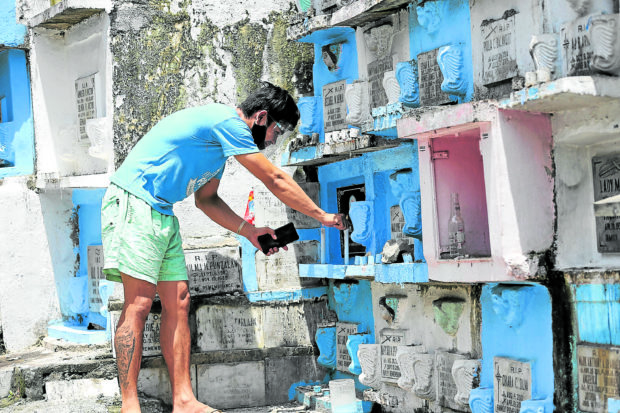Metro Manila cemeteries closed during ‘Undas’

EARLY VISIT A resident on Sunday lights a candle at the tomb of a loved one inside the Barangka Municipal Cemetery in Marikina City. —JOAN BONDOC
MANILA, Philippines — The new coronavirus pandemic has claimed as casualty in Metro Manila another tradition religiously followed by millions of Filipino Catholics throughout the country — visiting their departed loved ones in the cemeteries on All Saints’ Day.
The mayors of the 16 cities and one municipality in the metropolis on Sunday agreed to close cemeteries for the coming “Undas” season amid growing concerns over mass public gatherings and the rapid transmission of the COVID-19 virus.
Undas is a local term for Día de Todos Los Santos, or All Saints’ Day. It is derived from the Spanish word “honrar” meaning “to honor,” and refers to the tradition of honoring the dead on this day.
All Saints’ Day is observed as a public holiday in the Philippines on Nov. 1.
In a text message, Metro Manila Council (MMC) Chair Edwin Olivarez, who is also mayor of Parañaque City, said the mayors would be discussing the implementation rules of the shutdown of cemeteries in the metropolis in an online meeting on Sunday night.
Article continues after this advertisementManila was the first to announce the temporary closure of cemeteries, memorial parks and columbariums in the city on Oct. 31, Nov. 1 (All Saints’ Day) and Nov. 2 (All Souls’ Day) and Nov. 3.
Article continues after this advertisement‘Compelling need’
Mayor Francisco “Isko Moreno” Domagoso said there was a “compelling need to avoid the influx of people.” But he clarified that he would rescind his order should there be changes in government health measures before Oct. 31.
Manila North Cemetery in Santa Cruz and Manila South Cemetery in San Andres are two of the most visited burial grounds in Metro Manila. Last year, at least 930,000 people visited Manila North and at least 700,000 flocked to Manila South, according to Manila police estimates.
A Church official earlier said it was not really important that people go to cemeteries, stressing that visiting the dearly departed is not an obligation.
“When we celebrate the All Souls’ and All Saints’ Day, what is more important is prayer for the dead,” said Fr. Jerome Secillano, the executive secretary of the Catholic Bishops’ Conference of the Philippines’ public affairs committee.
Balanga diocese
Secillano said families could gather in prayer in their homes.
“They can also light candles and offer Mass intentions in their churches. If they can find time to visit the cemetery while it is still open, it is always a viable option to do so,” he said.
In Bataan, Balanga Bishop Ruperto Santos said his diocese had already informed the provincial government of its decision to close its Catholic cemeteries from Oct. 30 to Nov. 3.
“We prioritize public safety and security with this pandemic,” Santos said as he urged the faithful to remember their loved ones not only in the cemeteries “but also in our homes, especially in our hearts.”
“To remember them is to relive their good deeds,” he said.
The diocese will arrange parochial Masses for the commemoration of their faithful departed from Oct. 25 to Nov. 2, which the faithful can watch via livestreaming.
The faithful may send through text or online registration to the parish offices the names of their departed relatives, Santos said.
“We will have guided prayers to be available on our diocesan website and in the parishes for the deceased which our people can recite in their homes and light candles for them,” he said.
The Metro mayors’ decision to close the cemeteries during the Undas season was welcomed by some citizens, including Therese, who has been regularly visiting her younger sister at a columbarium in Quezon City.
Honoring the dead at home
“We could always remember my sister through prayers at home, and visit her some other time before or after Undas,” she said.
Therese was worried, however, that people could crowd in cemeteries before the implementation or after the lifting of the closure order.
Though thousands of people are still expected to flock to the cemeteries before, during or after All Saints’ Day, the general manager of the Metropolitan Manila Development Authority said he would bring up the matter with the MMC as well as plans for crowd control during the online meeting with the mayors.
In June, the Inter-Agency Task Force for the Management of Emerging Infectious Diseases revised lockdown guidelines in areas under general community quarantine, allowing visits to cemeteries and memorial parks for a group not exceeding 10 people.
Parañaque Mayor Olivarez encouraged families to just remember their loved ones from the confines of their homes.
Francesca and her family, who regularly visit their loved ones at La Loma Cemetery on weekends—a “tradition” that has also been broken during the COVID-19 pandemic—pushed the national government to implement stricter guidelines in cemeteries.
She noted that their regular visits were not the first casualties of quarantine restrictions but also activities during the Holy Week.
“We can go through with these traditions in a different way. We can commemorate the dead in other ways—ways that can help flatten the curve. It’s a sacrifice that might actually help [the country],” Francesca said.
—Wtih a report from Tina G. Santos
For more news about the novel coronavirus click here.
What you need to know about Coronavirus.
For more information on COVID-19, call the DOH Hotline: (02) 86517800 local 1149/1150.
The Inquirer Foundation supports our healthcare frontliners and is still accepting cash donations to be deposited at Banco de Oro (BDO) current account #007960018860 or donate through PayMaya using this link.